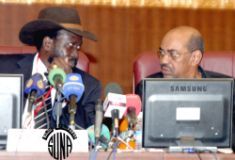Major political parties of Sudan’s govt hold first joint meeting
May 27, 2006 (KHARTOUM) — The two leading political movements in Sudan’s National Unity government opened their first joint meeting Saturday, 17 months after signing a peace agreement that ended more than two decades of civil war in the south of Africa’s largest country.
 President Omar al-Bashir, chairman of the ruling National Congress Party, and First Vice-President Salva Kiir Mayardit, chairman of the Sudanese People’s Liberation Movement, were lavish with their praise for both sides in abiding by the ceasefire that ended the conflict.
President Omar al-Bashir, chairman of the ruling National Congress Party, and First Vice-President Salva Kiir Mayardit, chairman of the Sudanese People’s Liberation Movement, were lavish with their praise for both sides in abiding by the ceasefire that ended the conflict.
They acknowledged, however, that difficult issues remained to be tackled – in particular the newly drawn border of the Abyei region from which rebels were to withdraw but have not.
“I am pleased that the (two parties)…have established this forum for a genuine dialogue to develop and transform our relations (toward building)…a strong and meaningful partnership,” Kiir, who wore his trademark cowboy hat, told the 150 delegates from both parties.
He said he looked forward to “comprehensive, permanent peace and stable democratic governance.”
Al-Bashir, avoiding any reference to particularly difficult religious themes, said the two-day session would “be a message to those who thought the two sides would only continue to be quibbling and opposing each other.
The rebels of the largely Christian and animist south battled against the islamist government in Khartoum. An estimated 2 million people died before the peace agreement was reached in January 2005.
In bid to show a new spirit of inclusion for the country’s diverse groups and religions, the meeting began with a performance by a folklore dance troupe that included both men and women.
Both al-Bashir and Kiir were at pains to recall the role played by the late First Vice-President John Garang in reaching the peace deal. Kiir, Garang’s longtime deputy, assumed the vice presidency when Garang died in a helicopter crash shortly after the peace agreement came into force.
“This meeting will help us…come to an agreement on mechanisms to fully implement fully the Comprehensive Peace Agreement. We will be able to evaluate what has been achieved so far and what should be done in case of disputes,” said Pagan Amum, secretary of the SPLM.
(ST/AP)
